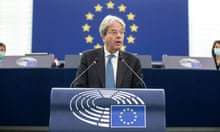The fallout from the Pandora papers leak continues to be felt around the world as one of the leaders caught up in the scandal, Kenya’s president, Uhuru Kenyatta, held talks with Joe Biden in the Oval Office.
Biden and Kenyatta underscored the need to bring additional transparency and accountability to domestic and international financial systems and to advance peaceful resolutions to the conflicts in Somalia and Ethiopia, according to a White House readout of their meeting.
The meeting is the first time Biden has hosted an African leader, and it comes just days after Kenyatta’s secret offshore ties were revealed.
Kenyatta is one of 35 current and former world leaders to feature in the leak, published last week by the Guardian and global media partners. It suggests Kenyatta and his close relatives have amassed more than $30m (£22m) of offshore wealth, concealed in offshore tax havens such as Panama.
Quick GuideWhat are the Pandora papers?
Show
The Pandora papers are the largest trove of leaked data exposing tax haven secrecy in history. They provide a rare window into the hidden world of offshore finance, casting light on the financial secrets of some of the world’s richest people. The files were leaked to the International Consortium of Investigative Journalists (ICIJ), which shared access with the Guardian, BBC and other media outlets around the world. In total, the trove consists of 11.9m files leaked from a total of 14 offshore service providers, totalling 2.94 terabytes of information. That makes it larger in volume than both the Panama papers (2016) and Paradise papers (2017), two previous offshore leaks.
Where did the Pandora documents come from?
The ICIJ, a Washington DC-based journalism nonprofit, is not identifying the source of the leaked documents. In order to facilitate a global investigation, the ICIJ gave remote access to the documents to journalists in 117 countries, including reporters at the Washington Post, Le Monde, El País, Süddeutsche Zeitung, PBS Frontline and the Australian Broadcasting Corporation. In the UK, the investigation has been led by the Guardian and BBC Panorama.
What is an offshore service provider?
The 14 offshore service providers in the leak provide corporate services to individuals or companies seeking to do business offshore. Their clients are typically seeking to discreetly set up companies or trusts in lightly regulated tax havens such as the British Virgin Islands (BVI), Panama, the Cook Islands and the US state of South Dakota. Companies registered offshore can be used to hold assets such as property, aircraft, yachts and investments in stocks and shares. By holding those assets in an offshore company, it is possible to hide from the rest of the world the identity of the person they actually belong to, or the “beneficial owner”.
Why do people move money offshore?
Usually for reasons of tax, secrecy or regulation. Offshore jurisdictions tend to have no income or corporation taxes, which makes them potentially attractive to wealthy individuals and companies who don’t want to pay taxes in their home countries. Although morally questionable, this kind of tax avoidance can be legal. Offshore jurisdictions also tend to be highly secretive and publish little or no information about the companies or trusts incorporated there. This can make them useful to criminals, such as tax evaders or money launderers, who need to hide money from tax or law enforcement authorities. It is also true that people in corrupt or unstable countries may use offshore providers to put their assets beyond the reach of repressive governments or criminal adversaries who may try to seize them, or to seek to circumvent hard currency restrictions. Others may go offshore for reasons of inheritance or estate planning.
Has everyone named in the Pandora papers done something wrong?
No. Moving money offshore is not in or of itself illegal, and there are legitimate reasons why some people do it. Not everyone named in the Pandora papers is suspected of wrongdoing. Those who are may stand accused of a wide range of misbehaviour: from the morally questionable through to the potentially criminal. The Guardian is only publishing stories based on leaked documents after considering the public interest. That is a broad concept that may include furthering transparency by revealing the secret offshore owners of UK property, even where those owners have done nothing wrong. Other articles might illuminate issues of important public debate, raise moral questions, shed light on how the offshore industry operates, or help inform voters about politicians or donors in the interests of democratic accountability.
A Biden administration official told Associated Press that Biden would raise the Pandora papers in one-on-one talks.
On Wednesday the White House press secretary, Jen Psaki, was asked if it was “rich” to discuss transparency with Kenyatta given that he was a “poster boy” for the use of murky offshore structures.
Biden had been “quite vocal” on inequities in the financial system at home and abroad, Psaki said, avoiding a direct answer.
Kenyatta has denied wrongdoing. He claims he is not named in the leak – despite reporting to the contrary – and says he will address the issue when he flies back to Kenya.
Like the Panama papers in 2016 – after which Iceland’s prime minister resigned – the Pandora papers have caused large-scale political turmoil, across Latin America and in Europe. The billionaire Czech prime minister, Andrej Babiš, lost an election last weekend that he had been widely tipped to win.
Babiš’s defeat came after it emerged he had set up a network of offshore companies. In 2009 he used them to buy a £13m villa in the south of France. The news is likely to have contributed to his populist party, the Action for Dissatisfied Citizens (AN), losing about 8% of its backing, with opposition parties now holding a narrow parliamentary majority.
Babiš says the purchase predates his time in politics. He is attempting to stay in power. On Wednesday he claimed that his main political patron, the Czech president, Miloš Zeman, had told him to carry on. The claim could not be verified as Zeman is in hospital and, according to reports, gravely ill.
Meanwhile in Ukraine, President Volodymyr Zelenskiy has dodged questions about his ownership of an offshore company in the British Virgin Islands. A comedian and actor turned politician, Zelenskiy won a landslide victory in a 2019 election by promising to clean up corruption.
While Zelenskiy declared several shell companies before the vote, he failed to disclose an interest in the firm Maltex Multicapital Corp. A documentary by the website Slidstvo.info unravelling Zelenskiy’s holdings has now been viewed 1.8m times, the highest number ever for a Ukrainian investigative film. On Monday Zelenskiy’s critics set up an impromptu screening outside his presidential palace in Kyiv as police looked on.
Zelenskiy’s defeated predecessor, Petro Poroshenko, has accused Zelenskiy of bringing Ukraine into international disrepute. Ironically enough, Poroshenko featured in the 2016 Panama papers leak. Zelenskiy’s associates have said he and his TV colleagues set up offshore companies in 2012 to protect their assets from the then president, Viktor Yanukovych, who has since fled to Russia.
Ukraine’s national agency for prevention of corruption is now examining official asset declarations by Zelenskiy and his longtime friend Ivan Bakanov. Bakanov is linked to the president’s network of companies and is executive chief of Ukraine’s powerful SBU security service. He has not replied to requests for comment. The agency’s findings are due on Monday.
Arguably, the Pandora papers have had the biggest impact in Latin America, where an estimated $40bn each year is diverted into offshore tax havens. A disproportionate number of past and present world leaders found in the data – 14 out of 35 – come from the region. Most hold conservative views. They include three wealthy businessmen who have gone on to become heads of state.
In Chile, opposition politicians have launched impeachment proceedings against the billionaire president, Sebastián Piñera, after the leak exposed new details of his extensive financial interests. They allege possible irregularities in a controversial mining deal.
Piñera’s family sold their stake in the Dominga mine project in 2010 to his close friend and business partner Carlos Alberto Délano. Documents suggest the third instalment of the payment contained a clause requiring the government not to strengthen environmental protections in the proposed area for the mine in the north of Chile, next to a nature reserve.
Piñera is reaching the end of his four-year term in office. He has rejected the accusations and says no irregularities took place. Chile’s public prosecutor’s office has announced an investigation into possible bribery-related corruption charges and tax violations linked to the deal, which was completed in the British Virgin Islands.
In Ecuador, meanwhile, the legislature voted to launch an investigation into the offshore finances of President Guillermo Lasso. It is alleged Lasso may have broken the law by moving money into tax havens, according to news reports. Lasso has previously had ties to 10 offshore companies and trusts in Panama, as well as the US tax havens of South Dakota and Delaware.
Lasso says his past use of offshore shell companies was legitimate. None were related to his public service, he said, adding that he dissolved these entities before running for president.









